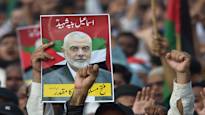The supreme leader of Hamas, Ismail Haniyeh, was assassinated on Thursday in Tehran in a building closely guarded by the Iranian Revolutionary Guard. Iran and Hamas blame Israel for the attack.
Hamas’s top leader Ismail Haniyeh was killed by a bomb blast, not an airstrike. This is what the newspaper says The New York Times based on his report. According to the newspaper, the bomb that killed Haniyeh had been planted in the guest house where he was staying about two months ago.
For its report, The New York Times (NY Times) interviewed seven administration employees from Middle Eastern countries and one from the United States. Among them were two Iranian sources.
The guest house that housed Haniyya is located in an upper-class residential area in a building complex controlled and protected by the Iranian Revolutionary Guard.
The map shows the building where the assassination took place:
The Hamas leader was in Tehran to attend the inauguration of Iran’s new president. According to NY Times sources, the bomb was detonated remotely when Hanyeh was confirmed to be inside his room. His bodyguard was also killed in the explosion.
A photo obtained by the NY Times shows damage to the corner of the Iranian National Guard guest house.
Haniyeh had stayed in the same guest house several times before while visiting Tehran, NY Times sources say.
Iran and Hamas have blamed Israel for the assassination. US officials interviewed by the NY Times also say that the US has come to the same conclusion in its assessments. The Mossad, the country’s foreign intelligence service, is mostly responsible for the assassinations carried out by Israel.
Israel has not admitted to being behind the attack. However, according to NY Times sources, Israel informed the United States and other Western countries about the details of the operation immediately after the attack.
Haniyeh lived in Doha, the capital of Qatar. However, Israel carried out its attack elsewhere than in Qatar, which acts as a mediator in the ceasefire negotiations. However, the assassination of a top Hamas leader deep in Tehran could lead to more widespread violence between Israel and its enemies.
It took months of preparation
Within the same day, another person at the top of Israel’s hit list was assassinated. On Tuesday, Israel killed in an airstrike the second-highest leader of Hezbollah, an ally of Hamas, operating in Lebanon By Fuad Shukri in Beirut.
A British newspaper of The Financial Times Hezbollah sources and experts interviewed by (FT) estimate that Israel used a voice recognition tool, artificial intelligence and spies to carry out the attack.
According to FT’s sources, Shukri’s murder came as a surprise to Hezbollah.
According to them, even before the attack in Beirut, the organization was “completely paranoid” about Israel’s intelligence capabilities.
In recent months, for example, the top leader of Hezbollah Hassan Nasrallah has ordered its fighters to dispose of their smartphones. Many in the organization have adopted old technology, such as pagers, landlines and messengers.
According to Iranian sources interviewed by the NY Times, the assassination of Hamas leader Haniyeh was also a huge humiliation and a catastrophic failure of intelligence and security operations for the Iranian Revolutionary Guard.
The guard uses the building complex that was the target of the attack for, among other things, secret meetings and hosting important guests.
Haniyyeh’s assassins managed to plant a bomb in a guest house so that it remained hidden for weeks before detonating it.
The NY Times could not find out how the bomb was installed in the building. According to the newspaper’s sources, the assassination was planned for months, and its execution required close monitoring of the building complex.
However, two Revolutionary Guard sources say that the bomb exploded in Haniyeh’s room. They say the precision and sophistication of the strike point to a similar remote-controlled AI weapon used by Israel in 2020 to kill an Iranian nuclear scientist by Mohsen Fakhrizadeh to assassination.
Israeli intelligence got its revenge
The attack by Hamas on October 7, 2023 was a catastrophic failure and a humiliation for Israeli intelligence. FT estimates that the assassinations of Shukri and possibly Haniyeh are a kind of revenge and a show of force for Israeli intelligence.
Assassinations have been part of Israel’s operational repertoire for decades. Israel has, among other things, killed Hamas fighters by poisoning and blowing up phones.
Head of Mossad David Barnea said in January that intelligence had an “obligation” to catch Hamas leaders.
Israel’s hunt for Hamas has already been compared to the aftermath of the 1972 Munich Olympics massacre. At that time, Palestinian fighters killed 11 Israeli athletes. Mossad’s revenge operation, known as the “wrath of God”, lasted ten years.
– It will take time, just like after the massacre in Munich. We still get them, wherever they are, says Barnea.
